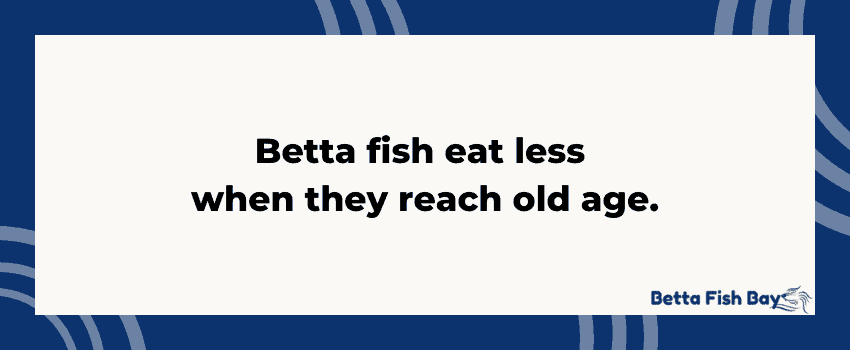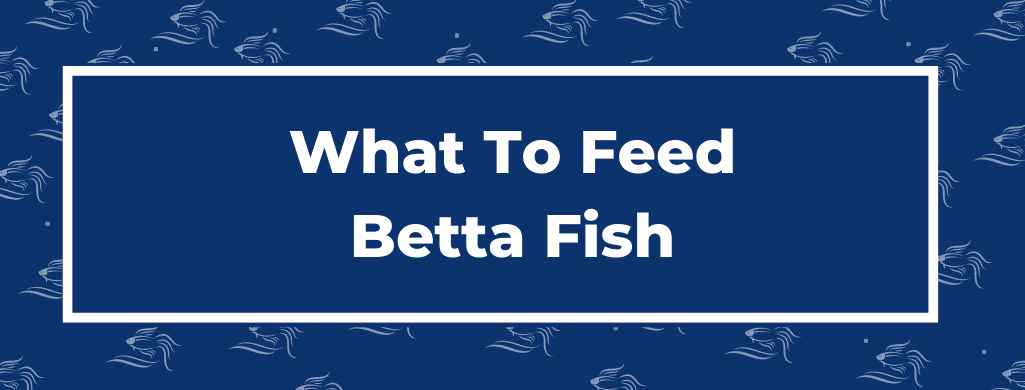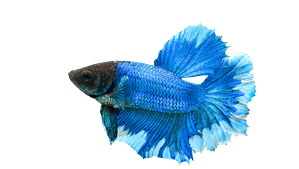Wild betta fish are never sure where their next meal comes from, so they eat whenever food is available.
This trait carries over into captive bettas, and many fish owners overfeed them.
“How often to feed betta fish?” is a common question, and we have the answer.
The ideal betta fish feeding schedule is twice a day, six days per week. A small meal in the morning and evening gives the betta’s digestive system time to process the food. Spreading the meals out instead of feeding one larger meal provides your betta energy throughout the day.

Table of Contents
How Often To Feed Betta Fish
Establishing a regular fish-feeding routine makes your betta feel secure about food. It also reduces the risk of overfeeding and keeps your betta healthy.
Betta fish eating habits vary according to a betta’s age, health, and environment.
An older betta may have a much different feeding schedule than a baby fish.
Understanding your betta’s diet according to its life stages makes it easier to determine the best feeding schedule for your fish.
Adult Betta Fish
For adult betta fish, the ideal feeding schedule is two times per day.
Wait at least 6-8 hours between each feeding for proper digestion. If you can feed early enough in the day, a 12-hour span between feedings is even better.
Betta fish rely on warm water to completely process their food. If the water in the tank is too cold, it leads to a slowed digestive tract, bloating, and constipation.
Ensure your betta tank has a temperature range of 78-80° degrees Fahrenheit (27° C) at all times.
Maintain a consistent tank temperature and avoid sudden fluctuations. Use a reliable thermometer to check temperatures regularly.
Never assume your heater is working correctly at all times. Even the best tank heaters break down from time to time.
Betta fish eat less when they reach old age.

The average lifespan for a captive betta is 2-5 years. If your betta is over three years old, you may need to offer smaller portions or reduce feedings to once per day.
Take cues from your betta fish when it comes to a feeding schedule. When your older betta starts rejecting its second meal of the day, it may be time for single daily feedings.
Pay attention to your betta’s health, as well. Rejecting or spitting out food may signal stress or an underlying illness.
Baby Betta Fish
Baby betta fish need more protein and fat than adults.
This means your baby bettas need 3-5 very small meals daily.
Food amounts depend on how many baby betta fish are in the tank.
The frequent meals must be very small, and you must not overfeed the tiny bettas.
As with adult bettas, ensure tank temperatures are 78-80° degrees Fahrenheit (27° C) for healthy digestion.
Baby betta fish reach their adult size around 6-10 months, depending on their sex and breed type.
Female betta fish have shorter fins and reach maturity between 4-6 months. Male bettas may take a full ten months to mature if they have long fins.
Gradually reduce feeding times as the baby bettas get older.
Once the small bettas reach adulthood, they should eat just two small meals daily.
How Much To Feed Betta Fish
Feed your betta fish the same volume of food as the size of its eyeball per meal.
This amount equals about 2-4 betta fish pellets per feeding. The exact quantity differs according to the type of food.
There is no need to soak pellets before feeding. Soaking dry pellets decreases their nutritional value and may swell too large for your betta to eat.
Also, the pellets expand in a betta’s digestive tract. Feeding too much at one time causes health issues like bloating, swim bladder disorder, and constipation.
Remove uneaten food from the tank when your betta finishes eating.
The food particles sink to the bottom of the tank and cause water quality issues. Besides a dirty tank, there may be ammonia or nitrate spikes.
Improper water parameters are dangerous for betta fish. Fin rot, dropsy, and fish fungus develop from poor water quality.
Store betta food properly in an airtight container and discard unused food every six months.
Betta food pellet containers are usually filled with more than your fish will ever eat. The nutritional value of the food degrades over time, so most pellets expire within six months.
What To Feed a Betta Fish

What you feed your betta fish is just as important as how often you do feedings.
This section touches on the topic. If you want our full review of the best options, check out our food for betta fish guide.
Pellets vs. Flakes
Betta fish pellets are the best choice for a staple diet.
Pellets contain the nutrients your betta needs and have a stable shelf life.
Look for betta pellets with at least 30% protein and without excess fillers.
Betta fish flakes are also available, but they have many downsides compared to pellets. Fish flakes do not contain as many nutrients as pellets and are messy during feeding.
Many bettas will not eat flakes because they quickly sink to the bottom of the tank.
Avoid tropical fish flakes made from plant-based ingredients. This food is unsuitable for carnivorous betta fish.
Determining the correct serving size of flakes is also more difficult than pellets.
Adding other types of food as part of a varied diet for your betta fish is important.
Live and Frozen Food
Live food is usually preferred over frozen food because it is easier to use. But storing live food is more difficult.
You must not buy live food in bulk because it will not stay fresh enough to use. One alternative is buying starter culture kits to raise brine shrimp or daphnia.
Mosquito larvae are another good food choice because they are easier to store and rich in essential nutrients.
Bloodworms, midge fly larvae, are also popular with betta fish.
Baby betta fish must be fed live food until they grow large enough to eat pellets.
Some good options for feeding baby bettas include:
- Grindal worms
- Black worms
- White worms
- Tubifex worms
- Baby brine shrimp
Once the baby betta fish are a few weeks old, you may give them crushed betta pellets.
Frozen food comes in cube form and may be stored for more extended periods. But, it must be thawed before feeding your fish.
Cut the cube into quarters and place pieces of the frozen food in a cup of tank water to thaw.
Thawing the frozen food makes it easy for your betta to eat and prevents water contamination from the packing juices.
Always buy fresh or frozen foods from a reputable source. This reduces the risk of parasites and diseases.
Freeze-Dried Food
Freeze-dried foods contain more nutrients than pellets but not as many as live foods.
The freeze-drying process destroys some of the vital nutrients.
Soak freeze-dried foods in tank water before feeding them to your betta. This process softens the food and makes it easier to digest.
Many fresh and frozen betta foods are in a freeze-dried option, like this freeze-dried daphnia.
What If a Betta Fish Is Not Eating?

There are several reasons a betta fish refuses to eat.
Stress is a major factor in a betta’s loss of appetite.
If you have just brought your betta fish home, it may not eat for a day or two. Give your betta time to adjust to its new surroundings before attempting to feed it again.
Cleaning the tank or introducing a new tank mate also causes a lack of appetite in betta fish.
Also, consider the water conditions and tank temperature.
If the tank temperature is too low, a betta’s metabolism slows down, and it is no longer interested in food.
Maintain a tank temperature of 78-80° degrees Fahrenheit (27° C), so your betta is comfortable.
Poor water quality may make your betta fish too sick to eat.
Test the tank water for contaminants like ammonia and nitrate. Aquarium water testing kits are available at most pet supply and fish stores.
Do a partial water change if the tank parameters are off. Always use de-chlorinated water to replace what you remove from the tank.
You must also rule out diseases and parasites if your betta refuses food. Treat illnesses in your betta as soon as symptoms appear for a better chance of a full recovery.
Old age is another reason your betta is not eating.
Betta fish have a short lifespan, and their appetite and activity levels slow down as they age.
If your betta fish is at least three years old and seems otherwise healthy, this is the likely reason for appetite loss.
Final Thoughts on Feeding a Betta Fish
We recommend feeding your betta fish two small daily meals, 6-8 hours apart.
Always serve your betta the correct quantity of food to prevent overfeeding. Health issues like bloating and constipation in bettas can prove fatal for bettas.
A consistent fish-feeding schedule matters as much to your betta as the type of food your choose.
Be aware of your betta’s behavior. If your betta suddenly stops eating, investigate and remedy the cause immediately.
Frequently Asked Questions
Do betta fish need to be fed every day?
Daily feeding is necessary for your betta’s health. Betta fish use a lot of energy when swimming because of their flowy fins. Feeding your betta every day helps your fish maintain its energy levels.
How long can betta fish go without food?
Betta fish can survive for 10-14 days without food, but it is unhealthy for them. If you are going out of town, we suggest asking a trusted friend or family member to feed your betta. Automatic vacation feeders are a bad idea because they are often unreliable.
Can you overfeed a betta fish?
It is quite easy to overfeed a betta fish. Most bettas will eat as much food as you are willing to provide. Overfeeding leads to obesity and digestive issues.
Swim bladder disease, bloating, and constipation are common in overfed bettas.
These conditions may be fatal without prompt treatment. Overfeeding also increases algae buildup and compromised water parameters due to the excess waste and food in the tank.
Should betta fish have a day of fasting?
Choose the same day every week as a day of fasting for your betta. It may seem cruel, but a day of fasting keeps your betta’s digestive tract moving smoothly. Do not introduce fasting to baby bettas until they mature. Baby bettas need constant nutrition to maintain healthy growth.
Do you feed breeding betta fish more often?
Feed breeding betta fish at least three times per day instead of two. Male and female bettas benefit from the extra nutrition needed for breeding.
Female bettas use the nutrients to form eggs, and the males need more energy to create a bubble nest. Check out our complete guide on how to breed betta fish for more info.


